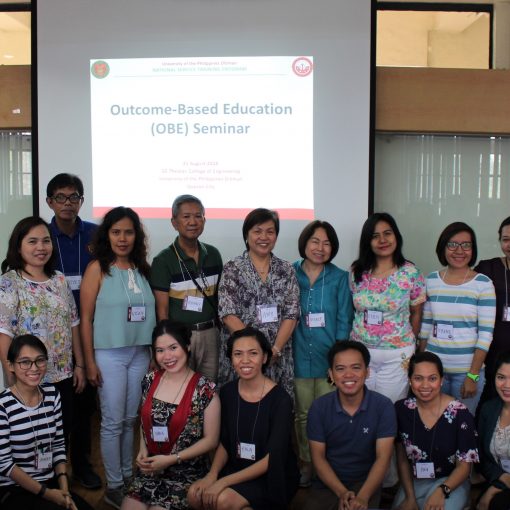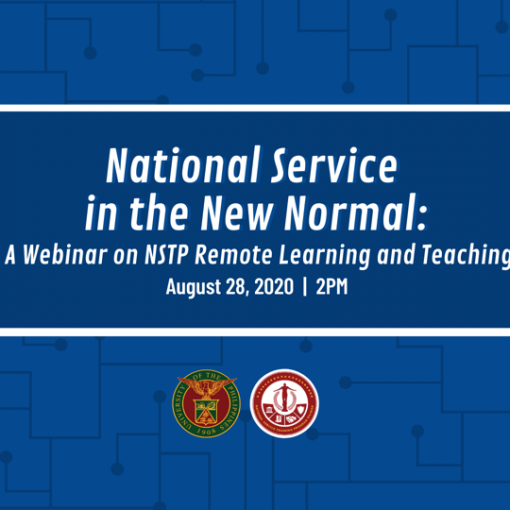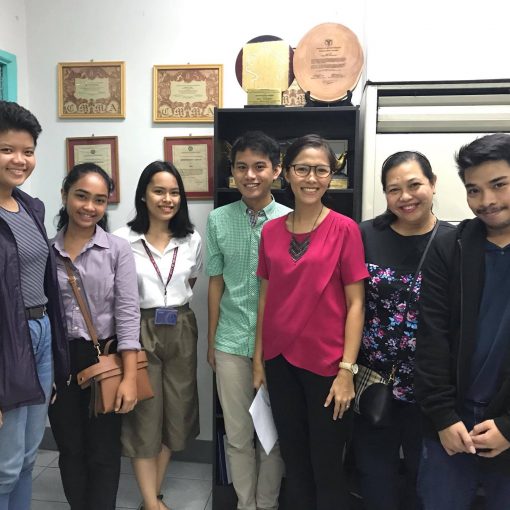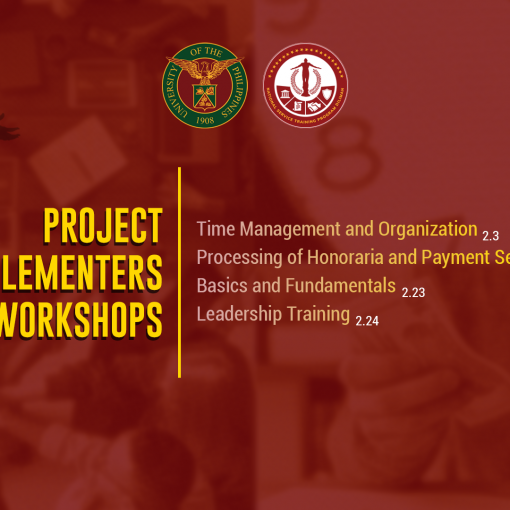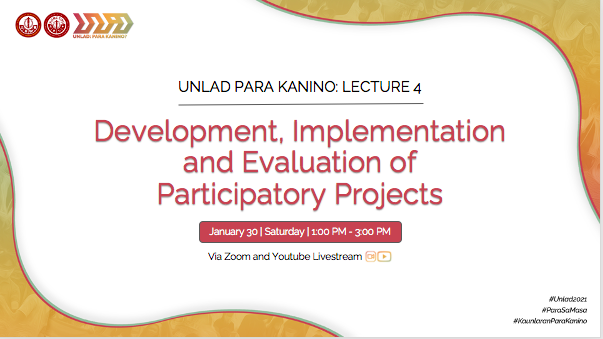
As the webinar series continued on its fourth run, its focus now shifted to Development, Implementation, and Evaluation of Participatory Projects. The first speaker for this webinar, Sir Karl Arvin Hapal from the Department of Community Development, College of Social Work and Development at the University of the Philippines Diliman, explained that the concepts he will be discussing are based on the concept of decolonization of development. As he said, this means that the development is being brought back to the people.
Prof Hapal’s first key point is about the conventional practices and methods that are used for participatory project development, implementation, monitoring, and evaluation. These include Logical Framework, Theory of Change, and SWOT Analysis. A logical framework is used to assess the contribution of small activities to the bigger objective. Theory of Change includes if-and-then-statements (if C is done, E will be the result) to assess a project. SWOT Analysis involves looking into the strengths, weaknesses, opportunities, and threats of a project. Prof Hapal claimed these methods as logic and evidence-based but he also claimed that these are not without limitations. He expounded by saying that these methods have philosophical biases. It was developed through the lenses of business and public administration – through managers and administrators. Due to their origin, these methods were subjected to top-down tendencies. Moreover, the conventional methods perceive a project life cycle like that of a tree. It is linear. Prof. Hapal contradicted this and said that a project life cycle is, in reality, not linear.
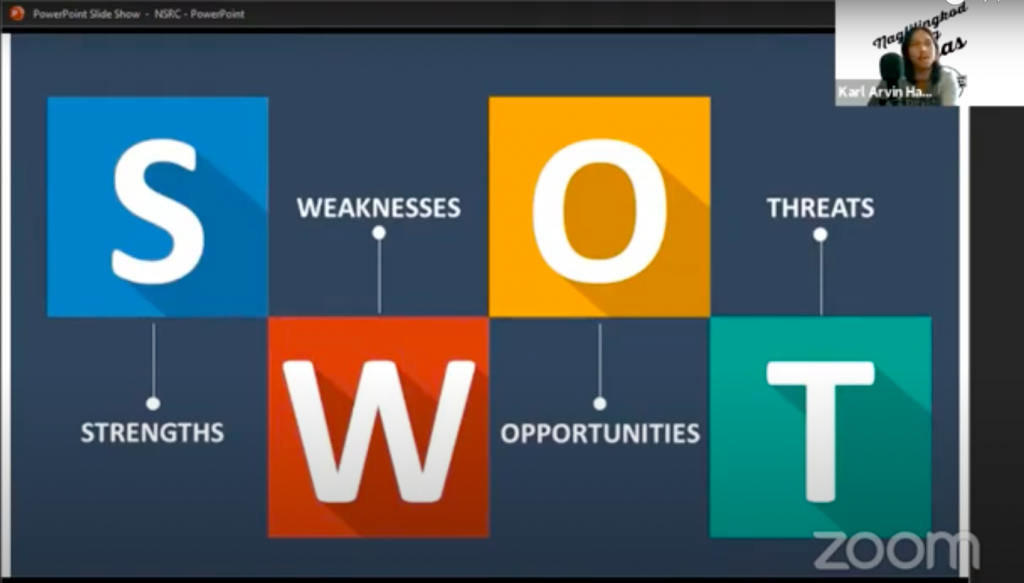
He challenged the participants to reexamine the planning, implementation, and evaluation of projects to make them aligned with the principles of people-centred development. By sharing an example based on his experience, Prof Hapal discussed how the reexamination is done. He mentioned the social enterprise of Maigting na Samahan ng Panlipunang Negosyante or Igting from Towerville, a relocation site in San Jose Del Monte Bulacan.
There are three key points on how Igting was able to sustain its social enterprise. First was the “plano vs kolektibong pangarap at shared values.” This indicates that Igting focused more on affirming their aspirations and shared values rather than sticking rigidly to a plan. This reflected on their planning session which centered on various forms of visioning exercises that aim to reaffirm shared values and aspirations. The second key point is “regimented practice vs iteration and reiteration” which means that Igting focused on iterative and reiterative processes like weekly action-reflection sessions. These sessions aimed to review and change their accustomed practices and organizational structures. The third and last key point is “changes vs metrics.” This highlights Igting’s emphasis on the intangibles in the assessment which includes monitoring and evaluation of changes in their practices. Some examples of the aspects they monitor and evaluate are their unity, perseverance, and adherence to the tasking system.
The speaker reminded everyone that there are various ways to develop a plan, implement, and evaluate a project which development practitioners should be aware of. Also, awareness of the possibility to come from a privileged point of view when developing, implementing, and evaluating a project is a must. Failure to do such can create a project that is imposing rather than enabling. He ended his presentation by saying that development practitioners should develop horizontal relationships with the community instead of vertical ones. This would mean that the development practitioners should treat the community as equals.
The second speaker who shared information and experiences is Miguel Novero. Novero is one of the co-heads of the Save San Roque (SSR) Alliance Campaign Committee which oversees the advocacy and campaign track of the Alliance based on the community’s interest. He is also the policy advocacy officer of Pambansang Kilusan ng mga Samahang Magsasaka or PAKISAMA and closely works with the farming, fisherfolks, and indigenous communities especially with rural youth.
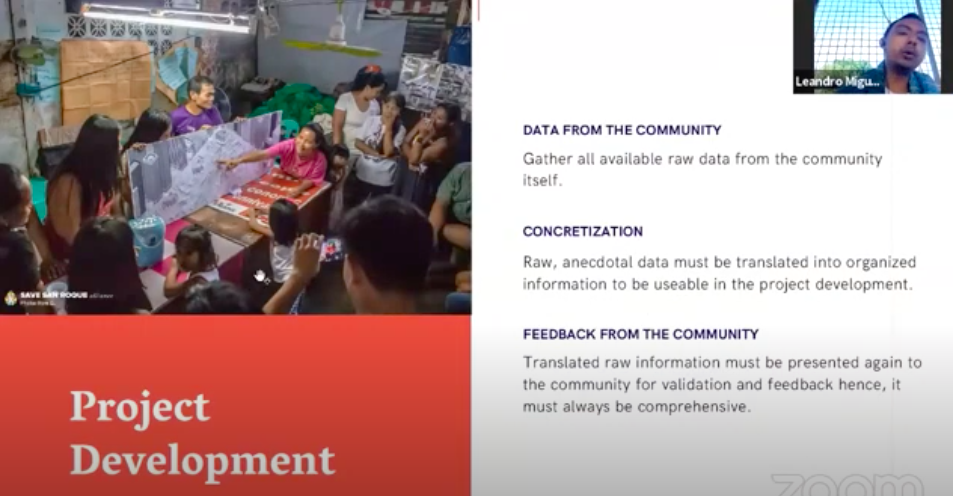
His presentation was divided into five (5) parts – issue identification, project development, project implementation, monitoring and evaluation, and tips for development practitioners. On issue identification, the speaker mentioned that their overlying principle for this process is “palaging mula sa masa, para sa masa.” In their case in SSR, there are general issues like demolition. However, the speaker mentioned that there are also issues present in San Roque depending on the context of the situation like joblessness and hunger. To identify issues, it is important to first know the interest of the community. Secondly, organize various interests of the stakeholders in the community. Lastly, trust the community. According to Novero, the community knows its local dynamics. They know their materials and resources. The community is also assertive and they know how to stand their ground. Community is decisive. As Novero puts it, “sa kanila nagsisimula at nagtatapos ang lahat ng pagpapapasya.”
He then proceeded to the project development process which he mentioned should start from data gathering. He emphasized the importance and usefulness of raw and anecdotal data. The next step is concretization which is the translation of anecdotal data into a more organized and technical form for government engagement or funders for example. However, there should also be a form that the community will understand for them to give feedback. In project implementation, the different stakeholders in the community should agree and adhere to the same set of values and beliefs. A campaign is also needed, whether internal or external, to strengthen the implementation of the project. The organization includes the distribution of tasks, work schedules, and logistics. The speaker reminded everyone that the first two – values and beliefs and campaign should be established first before organizing. He agreed with Prof Karl that metrics are indeed important for monitoring and assessment. However, anecdotal evidence is also important. Although the 1-to-5-rating system is beneficial, there is significant information that this system failed to cover.
As the last part of this presentation, Novero highlighted several tips for development practitioners. Leaving assumptions about the community, letting the community decide for themselves, trusting the community, disregarding the idea that the development practitioners are the savior of the community, and forming strong relationships and bonds with the community are the speaker’s tips for the development practitioners.
Since its launch a few weeks ago, the webinar continues to explore the nitty-gritty of participatory project development and management. Nearing the end of the webinar series, it has maintained the quality and relevant discussions it started with. With the remaining webinar left, these standards were expected to be upheld.


